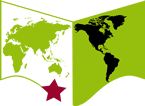Dates
1743 - 1826
Creator Type
Biographical/Historical Note
Thomas Jefferson (April 13, 1743 (April 2, 1743 O.S.) – July 4, 1826) was an American Founding Father, the principal author of the Declaration of Independence (1776) and the third President of the United States (1801–1809). At the beginning of the American Revolution, he served in the Continental Congress, representing Virginia and then served as a wartime Governor of Virginia (1779–1781). Just after the war ended, from mid-1784 Jefferson served as a diplomat, stationed in Paris. In May 1785, he became the United States Minister to France.
Jefferson was the first United States Secretary of State (1790–1793) serving under President George Washington. With his close friend James Madison he organized the Democratic-Republican Party, and subsequently resigned from Washington's cabinet. Elected Vice President in 1796, when he came in second to John Adams of the Federalists, Jefferson opposed Adams and with Madison secretly wrote the Kentucky and Virginia Resolutions, which attempted to nullify the Alien and Sedition Acts.
Elected president in what Jefferson called the Revolution of 1800, he oversaw the purchase of the vast Louisiana Territory from France (1803), and sent the Lewis and Clark Expedition (1804–1806) to explore the new west. His second term was beset with troubles at home, such as the failed treason trial of his former Vice President Aaron Burr. With escalating trouble with Britain who was challenging American neutrality and threatening shipping at sea, he tried economic warfare with his embargo laws which only damaged American trade. In 1803, President Jefferson initiated a process of Indian tribal removal and relocation to the Louisiana Territory west of the Mississippi River, in order to open lands for eventual American settlers.
A leader in the Enlightenment, Jefferson was a polymath who spoke five languages fluently and was deeply interested in science, invention, architecture, religion and philosophy, interests that led him to the founding of the University of Virginia after his presidency. He designed his own large mansion on a 5,000 acre plantation near Charlottesville, Virginia, which he named Monticello. While not a notable orator, Jefferson was a skilled writer and corresponded with many influential people in America and Europe throughout his adult life. He is rated by historians as one of the greatest U.S. presidents.
Though Jefferson owned many slaves, he opposed the institution all his life and consequently treated and took care of them very well and expected them to work no more than free farmers. Since 1802 historians and others have been divided over the controversy of whether Jefferson was the father of one or more children belonging to Sally Hemings, a slave at Monticello. Historians are also in disagreement with how much Jefferson was committed to the anti-slavery cause. In 1807, President Jefferson signed into law a bill that banned the importation of slaves into the United States. After Martha Jefferson, his wife of eleven years, died in 1782, Jefferson remained a widower for the rest of his life; their marriage produced six children, of whom two survived to adulthood.
Jefferson was the first United States Secretary of State (1790–1793) serving under President George Washington. With his close friend James Madison he organized the Democratic-Republican Party, and subsequently resigned from Washington's cabinet. Elected Vice President in 1796, when he came in second to John Adams of the Federalists, Jefferson opposed Adams and with Madison secretly wrote the Kentucky and Virginia Resolutions, which attempted to nullify the Alien and Sedition Acts.
Elected president in what Jefferson called the Revolution of 1800, he oversaw the purchase of the vast Louisiana Territory from France (1803), and sent the Lewis and Clark Expedition (1804–1806) to explore the new west. His second term was beset with troubles at home, such as the failed treason trial of his former Vice President Aaron Burr. With escalating trouble with Britain who was challenging American neutrality and threatening shipping at sea, he tried economic warfare with his embargo laws which only damaged American trade. In 1803, President Jefferson initiated a process of Indian tribal removal and relocation to the Louisiana Territory west of the Mississippi River, in order to open lands for eventual American settlers.
A leader in the Enlightenment, Jefferson was a polymath who spoke five languages fluently and was deeply interested in science, invention, architecture, religion and philosophy, interests that led him to the founding of the University of Virginia after his presidency. He designed his own large mansion on a 5,000 acre plantation near Charlottesville, Virginia, which he named Monticello. While not a notable orator, Jefferson was a skilled writer and corresponded with many influential people in America and Europe throughout his adult life. He is rated by historians as one of the greatest U.S. presidents.
Though Jefferson owned many slaves, he opposed the institution all his life and consequently treated and took care of them very well and expected them to work no more than free farmers. Since 1802 historians and others have been divided over the controversy of whether Jefferson was the father of one or more children belonging to Sally Hemings, a slave at Monticello. Historians are also in disagreement with how much Jefferson was committed to the anti-slavery cause. In 1807, President Jefferson signed into law a bill that banned the importation of slaves into the United States. After Martha Jefferson, his wife of eleven years, died in 1782, Jefferson remained a widower for the rest of his life; their marriage produced six children, of whom two survived to adulthood.
Sources
Wikipedia (en)
Book(s) by Jefferson, Thomas
Displaying 1 - 1 of 1
| Title | Date of Publication |
|---|---|
| Communism, Fascism and Democracy. The Theoretical Foundations | 1962 |
